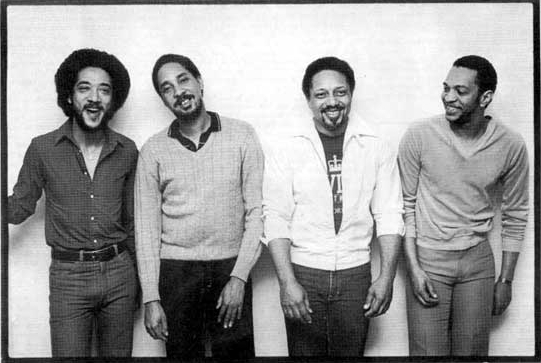Yeah, you right! For funk fans and New Orleans music aficionados, yesterday’s news that Southern funk progenitors the Meters were among the Rock and Roll Hall of Fame’s class of 2013 nominees couldn’t have come any sooner.
Last year, Los Angeles Times columnist Randall Roberts contended that 2012 Hall inductees the Red Hot Chili Peppers and the Beastie Boys both “owe a great debt to the Meters, a New Orleans instrumental band whose grooves have become an archetype. (The Meters aren’t in the Hall of Fame? Oof. A travesty.)”

2013 Rock and Roll Hall of Fame Nominees the Meters (L-R) Leo Nocentelli, Joseph "Zigaboo" Modeliste, Art Neville and George Porter Jr photo by Rick Olivier.
Randall’s outcry, however, wasn’t the first to bring attention to this glaring omission. Following Dr. John’s 2011 induction, the Facebook page “Let’s Get The METERS into the Rock and Roll Hall of Fame!!” sprang up. Though only a loosely organized effort, at the time of yesterday’s announcement, the page had accumulated 4796 fans.
But the Rock and Roll Hall of Fame has not completely ignored the Meters through the years; the New Orleans groove machine comprised of keyboardist Art Neville, bassist George Porter Jr., guitarist Leo Nocentelli and drummer Joseph “Zigaboo” Modeliste was previously nominated in 1997. Nevertheless, the Meters aren’t the only longtime, first-time or multiple-time slights to land on this year’s ballot. Prog rock juggernaut Rush, whose rabid fanbase has long since championed its cause, received its first nomination while disco powerhouse Chic received its seventh — the most of any group currently not inducted. And while each of these acts rightfully deserves its due, the most surprising name on 2013’s nominations list is that of legendary, left-handed bluesman Albert King. A strong case could be made that the sound of the electric guitar as we know it was first forged in the stinging, singular tones of the 6-foot-4, 250-pound stalwart’s Flying V.
Forgotten, snubbed or simply passed by, it’s just as easy to speculate about why so many pivotal acts who’ve defined their respective genres and shaped the course of popular music have been left out of the Hall as it is to rant about why so many others warrant a nod. It’s also just as valid to ask why a Rock and Roll Hall of Fame need exist at all. Rock and Roll, at least in spirit (I hope), aligns itself against the socio-political institutions that seek to subvert its status. And, well, you’ll be hard pressed to find an institution more diametrically opposed to the rebellious spirit of rock than, say, a museum — a paradox the exemplar anti-establishment, establishment band the Sex Pistols brought to light in 2006 when they referred to the landmark as a “piss stain” in a scribbled letter declining the coveted honor. Despite the formative punk group’s declaration and their absence at the induction ceremony, the Pistols were ultimately inducted.
In April 2012, Guns N’ Roses frontman Axl Rose, unable to reach an amicable resolution with his former bandmates, penned an open letter to the Rock and Roll Hall of Fame outlining this conundrum in much greater detail:
For the record, I would not begrudge anyone from Guns their accomplishments or recognition for such. Neither [sic] I or anyone in my camp has made any requests or demands of the Hall Of Fame. It’s their show not mine.
Exactly who that “their” Rose refers to is, is still up for debate.
Meta matters aside, in recent years, music fans, journalists and musicians alike have raised more pointed criticisms of the Rock and Roll Hall of Fame’s selection process. In a 2007 USA Today article, author and longtime OffBeat contributor, Brett Milano remarked that “entire genres get passed over, particularly progressive rock, ’60s Top 40, New Orleans funk and a whole lot of black music.”
Though it’s no secret that a lack of transparency has always been an issue with the Hall, oftentimes allegations of such biases resonate on a much deeper level, singling out RRHoF and Rolling Stone co-founder Jann Wenner’s personal preferences as the source.
In a 2011 interview, Chris Squire, founding member and bassist of the progressive rock group Yes, shared his sentiments on the subject with me:
I don’t really know how they determine the candidates for the Rock and Roll Hall of Fame. I know Jann Wenner, the guy who runs Rolling Stone, is a big influence on the way things go, and Rolling Stone has never been a fan of progressive music. Having said that — whether or not Yes deserves to get in at some point — we were, after all, one of the best-selling progressive acts and biggest stadium rock acts of all time. Maybe at some point, somebody will notice that (laughs). They did put Genesis in there, though. So maybe that’s a token move towards progressive music. We’ll see what happens.
Whether or not the Rock and Roll Hall of Fame has, does or ever will weigh the merits of its critics is moot. What has happened, no less, is that for the first time in its history, the Rock and Roll Hall of Fame is willing to give creed to its patrons’ voice(s). For the next two months, the public can vote for five nominees that they believe deserve a place in the pantheon. In the end, the top five vote-getters will constitute a “fans’ ballot” that will be tallied along with the 600+ other ballots cast in determining 2013’s inductees — a token gesture, surely, but a step more in tune with the spirit of Rock and Roll than any the RRHoF has ever taken.
Other nominees on this year’s ballot include: Heart, Deep Purple, Donna Summer, Public Enemy, N.W.A., Randy Newman, Joan Jett & the Blackhearts, the Paul Butterfield Blues Band, Kraftwerk, the Marvelettes and Procol Harum. Voting is open through December 5. To cast your vote, click the button below:





